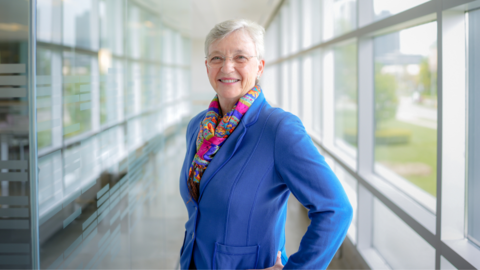
By Tienna Schade
As Dr. Daphne McCulloch nears her retirement at the end of August, her career will come full circle. Almost 50 years ago to the day, the now-professor started her undergraduate degree at the University of Waterloo in the Faculty of Science.
Having grown up across Southern Ontario in Sarnia, Simcoe and Oshawa, McCulloch first decided she wanted to pursue optometry at the end of high school and came to Waterloo intending to apply to the Doctor of Optometry program. She enjoyed taking care of people and knew she wanted to go into the health sciences.
After graduating as part of the OD Class of 1979, McCulloch was among the first optometrists to enter a residency in primary care (at Pennsylvania College of Optometry, now Salus University). There, she realized her passion for teaching and research and decided to pursue a PhD to facilitate this career decision.
“It’s wonderful to teach students who are so motivated and so bright,” she says.
As her interests evolved, McCulloch found her niche: working with young children and people with special needs. Over the years, she has taught countless students the best ways to interact with these populations in a clinical setting – one of her favourite parts of her job. Additionally, she has completed extensive research, particularly in clinical electrophysiology.
There are a variety of tests that fall under the umbrella of clinical electrophysiology, but they share one principal theme – measuring the electrical signals in the visual system as it responds to different visual stimuli. Gathering information in this way is extremely important when treating young children and those with special needs, since often these individuals may not be able to verbally express what they can or cannot see.
McCulloch’s interest in clinical electrophysiology led her to serve as the past secretary-general of the International Society for Clinical Electrophysiology of Vision (ISCEV). She now serves as the editor-in-chief of the ISCEV official journal, Documenta Ophthalmologica. In 2019, she was awarded the ISCEV Emiko Adachi Award for longtime outstanding service to ISCEV and significant contributions to clinical electrophysiology of vision. As part of the award, she delivered the Emiko Adachi Scientific Lecture. Her talk was titled, “What can my baby see? Clinical electrophysiology of infant vision.”
In the decades since the beginning of her career, McCulloch has witnessed academia shift from being paper based to being strongly reliant on technology. She remembers sifting through research journals by hand and typing up documents on typewriters and word processors. She purchased her first PC during her PhD. If you ask McCulloch what the overall biggest change has been, she’ll wholeheartedly say the availability and access to information.
“Back then, the human genome hadn’t been mapped out, so when it came to genetic diseases, nobody would know what genes were involved,” she says, giving an example. “Now, we have gene identification tools”.
McCulloch’s work has taken her to all corners of the globe. After completing her PhD in Indiana, McCulloch became director of the clinical electrophysiology units in the Ophthalmology Department at the Hospital for Sick Children (SickKids) in Toronto before heading south to the Children’s Hospital in Los Angeles to undertake a similar role. The bulk of McCulloch’s career was spent across the pond as a professor at Glasgow Caledonian University. There, her research included hospital-based clinical trials with newborns at high risk for visual dysfunction – premature infants and infants with prenatal exposure to drugs of misuse.
For the past 11 years, she has been back in Waterloo, where conferences and other work obligations have taken her to places such as South Korea, Japan, and most recently, Hong Kong.

McCulloch with colleagues at the iCover 2024 conference in Hong Kong
After she retires, interacting with little children will be one of the things McCulloch will miss most, since all the babies in her life have grown up. She’ll also miss mentoring her students and seeing the lightbulb go off in their heads when something clicks. As much as she’ll miss her patients and students, McCulloch looks forward to being less busy and sleeping in more. She hopes to renovate parts of her house, particularly the kitchen, and is eager to spend more time travelling. She doesn’t have any fixed plans but is excited to have added flexibility to explore more of what the world has to offer.
This isn’t the complete end of the road for McCulloch’s career, though – she plans to stay with the School of Optometry and Vision Science as an adjunct professor to tie up loose ends and finish a few research projects.
“I’m excited to turn the focus to work I want to do and spend less time doing work I have to do,” she says with a laugh. “I’m retiring, but not gone yet”.